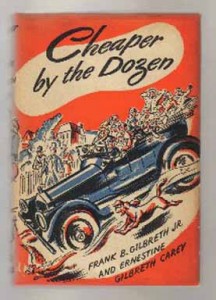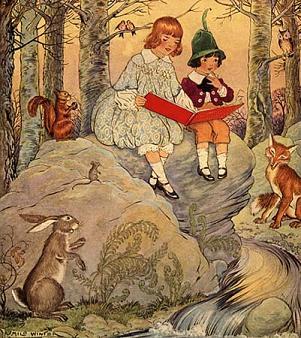Homeschool by the dozen
 I must have been about 11 when I read Cheaper by the Dozen. I really don’t remember much about it, though I retain a haze of good feeling. The one thing I remember clearly is that the father of that large family put a record player in the bathroom and insisted that his children listen to foreign language records whenever they were in there. Eventually they all became fluent in a second language.
I must have been about 11 when I read Cheaper by the Dozen. I really don’t remember much about it, though I retain a haze of good feeling. The one thing I remember clearly is that the father of that large family put a record player in the bathroom and insisted that his children listen to foreign language records whenever they were in there. Eventually they all became fluent in a second language.
The book must have influenced me more than I realized, because in my first year as a homeschooler, I find myself using audiobooks quite a bit as a way of making books a main course in our lives. We check them out of the library, give them for birthdays, listen while they’re busy with other activities during free time instead of watching television. My daughters, ages 7 and 4, have responded positively, and though I usually have no problem seeing the downside of things, I really can think of no criticism of the use of audiobooks. Used not as a substitute, but as a supplement, to parental read-alouds, they can be an incredible resource for a homeschooler.
This site contains a rundown of a number of the potential benefits, including increased listening skills, vocabulary, pronunciation, and use of the imagination. My oldest just turned 7, and I’m pleased with her reading skills. But she could never sit down and read through the Narnia books on her own, and for me to read them would take much longer. I’m reading various Marguerite Henry stories to her now (she’s horse crazy), and it takes maybe a week, sometimes two, to get through one of them, reading a little each day. But King of the Wind was available on cassette at the library, and we listened to the whole story in an afternoon. Then of course, she listened several more times before we took it back to the library. Audiobooks allow much more time for literature than my parental availability can, providing some great material for an eager, absorbent mind.
Children will listen to works that are beyond their level when they’re read orally, challenging them in vocabulary and conceptualization. The Little House books have been enriching for my daughter, and we’ve listened through On the Banks of Plum Creek. There’s a great deal of practical knowledge to be gained from the young heroine of these novels, and I’ve often been surprised by the level of insight accessible to a 7-year-old. Similarly, we’re using Susan Wise Bauer’s Story of the World series for ancient history, and because my daughter loves history so much I bought her the audiobook. She’s free to listen as often as she wants to the chapters we’ve already studied together. It amazes me to hear the commentary she offers on life, seen through a historical lens. Yesterday as she listened to the story of Shamshi Adad, she commented that he wasn’t a good ruler because of his brutal tactics. “He should rule through being truthful and fair, like Jesus and Asoka,” she volunteered while building a lego stable. And today at the lunch table, when I overheard her little sister whisper, “I’m on your team!” when she was about to be disciplined, I said, “So, you’re banding together, huh?” My 7-year-old laughed and said, “Just like the Greeks. They fought with each other except when they had to fight Persia.” (I’m Persia in this scenario. Oh goody.)
Sheer repetition is another virtue of audiobooks. Maybe this point is made already. We all know that children love to hear the same stories over and over, and I comply when I’m reading to them. I see the value of this. But I certainly don’t mind when someone else is available to take the rereading reins, particularly if it’s something I don’t really enjoy. (Curious George and Mother Goose, for instance.)
Last but not least, the quality of materials is often superb. Cherry Jones, who reads the Little House stories, has a wonderfully warm and expressive voice, and the fiddle music punctuating her reading is something I couldn’t supply. Similarly, the Dr. Seuss audiobook we own is read by a cast of actors who bring all their dramatic skills to the table in the service of young readers, and the results are enjoyable for “children” of all ages. The Frog and Toad stories are read by Arnold Lobel himself, and his friendly voice makes the concept of the author much more than a name on the cover. Ditto for E.B. White’s readings. Last but not least, the Narnia stories read with a British accent have spoiled me forever.
So this is a rave, nothing less. The only potential downside I see is that audiobooks might foster in children an impatience with the slower and more skill-dependent process of reading for themselves. So far, I don’t see that happening. Nor do I see them losing their desire to hear me read to them, even though I’m not nearly as dramatic a reader as some of the cd’s I’ve cited. I have a vague anxiety at times that I’m “programming” them, but the medium doesn’t really permit that. For encouraging a love of language in all its rhythms and possibilities, for challenging their imaginations and their vocabularies, for insisting on active thinking rather than passive absorption, audiobooks are difficult to unseat. Am I missing something? If so, I hope one of my readers will clue me in.


